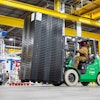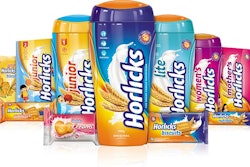Tainted milk from China's largest dairy company, discovered amid a state crackdown on food safety, is set to be a windfall for foreign companies such as Nestle SA.
China Mengniu Dairy Co., which supplies China's astronauts and athletes and is part-owned by the government, faces protests after regulators found toxins in its milk last month. The dairy company's shares have dropped 25 percent in two weeks and its website has been vandalized by hackers.
The backlash may hurt Mengniu's earnings, lure consumers away from local dairy brands and drive the government to clamp down further on foodmakers. Foreign companies, from Switzerland's Nestle to France's Danone, may profit from renewed food-safety fears, three years after contaminated local formula killed six babies.
"This scandal is another black mark on Chinese firms' reputation," said Jessica Lo, managing director at China Market Research Group, based in Shanghai. "Foreign food brands will benefit. Companies like Danone and Nestle should see a bump in sales."
Nestle is accelerating investment in its dairy business in Shuangcheng, China, and investing in a new dairy training institute, Jonathan Dong, a spokesman, said by e-mail. Nestle's Shuangcheng factory has close to 100 people in testing and monitoring and has a "very sophisticated" test capability in its factories, he said.
Baby Food Pouches
HJ Heinz Co., the Pittsburgh-based food maker, started selling baby food packed in pouches in China last year, which costs less than food in jars. Business in China will double during the next three years, CEO William Johnson said in November.
Mead Johnson Nutrition Co., the baby-food maker based in Glenview, IL, in November opened a 53,000 square-foot pediatric nutrition research institute in Guangzhou, southern China. The company made $745 million of sales in China in 2010, more than doubling in two years and accounting for 24 percent of its total, according to data compiled by Bloomberg. Mead Johnson had a 12 percent share of China's milk formula market in 2010, Danone had 10 percent, and Nestle 2.3 percent, according to London-based researcher Euromonitor International.
China's government has tried rebuilding confidence in its food industry through factory inspections and regulation. Mengniu was taken over partially by a unit of state-backed food company Cofco Corp. after being identified among 22 Chinese companies that sold baby formula containing melamine in 2008. Cofco's Chairman Ning Gaoning replaced founder Niu Gensheng as chairman in 2011.
Lower Estimates
Safety infractions have surfaced in the industry even as the government seeks to improve standards. Toxins above normal levels were found in one batch of milk from closely held Fujian Changfu Dairy Industry Group Co. and in another from Mengniu, regulators said on Dec. 24.
Deutsche Bank on Dec. 27 lowered its estimates for Mengniu's 2012 and 2013 per-share earnings by about 9 percent on concern consumers' confidence in its brands will be hurt. The milk producer's stock-price forecast was cut at Deutsche Bank to HK$22.60 from HK$31.50. Mengniu has dropped HK$6.60 to HK$19.70 since Dec. 23.
Consumers "will immediately shift to foreign brands when they learn about the Mengniu incident because they have stronger trust in overseas companies," said Tracy Sun, an analyst at CSC Securities HK Ltd., based in Hong Kong.
Lu Jianjun, a Hohhot-based Mengniu spokesman declined to comment when reached by phone.
Market Share
Mengniu has the biggest share of China's milk market, with 24 percent, followed by Inner Mongolia Yili Industrial Group Co. at 20 percent, according to Euromonitor. Vevey, Switzerland-based Nestle has 1.5 percent. France's Danone has a 1.5 percent share in a separate yogurt and sour-milk drinks category.
China's market for milk products is expected to surge 66 percent to 232 billion yuan in 2015 from 2010, Euromonitor data show.
Sales of foreign food brands grew in China during the 2008 scandal involving melamine-tainted milk, which killed at least six infants and sickened 300,000 people. Mengniu reported a 2008 loss of 949 million yuan ($151 million) and Yili lost 1.7 billion yuan.
Nestle's sales in China, Hong Kong and Taiwan rose 10 percent to 2.23 billion Swiss francs that year, or $2.1 billion using exchange rates at the time. Mead Johnson Nutrition Co. had a "temporary increase in demand" as competing products were pulled off shelves, the company said in its 2008 annual report.
'Wealth's Curse'
Multinationals in China have been better at maintaining product safety, said Jason Ding, vice president at management consultancy Roland Berger AG in Beijing. Quality has become a "secondary" concern for Chinese companies pushing to increase sales in the world's fastest-growing major economy, he said. "It's like wealth's curse."
Niu founded Mengniu, which means "Mongolian Cow" in Chinese, in a six-floor building in Hohhot, capital of the Inner Mongolia autonomous region, in 1999. It now employs about 25,000 people and has annual production capacity of 6 million tons. Last year's sales of 30.3 billion yuan ($4.8 billion) are almost triple the level five years ago.
Mengniu supplied China's first astronaut, Yang Liwei, with milk for outer space, according to its site, which shows top state leaders, including President Hu Jintao, inspecting the company's facilities.
Biggest Concern
China's government has shut 5,000 companies, arrested 2,000 people, and given at least one death sentence in a crackdown on food safety in 2011. State and local governments hold stakes in the country's largest food makers including Bright Dairy & Food Co. Ltd. and Yili.
Cofco Dairy Investment Ltd., a company affiliated with Cofco Corp., China's largest food maker, is Mengniu's biggest shareholder with a 19.7 percent stake, according to data compiled by Bloomberg.
Food and product safety is the biggest concern for consumers, China Market Research found in interviews with 5,000 people in 15 cities last year. "They were more worried about that than paying for medical care or education costs," said Lo. "The food supply chain in China is a mess and smart companies will benefit by ensuring the best quality."
"Hacked By:Drift"
Mengniu said moldy feed given to cows caused December's tainted milk, which was destroyed. It promised to "reinforce quality control" by monitoring each production step.
That hasn't appeased some consumers. On Dec. 28, hackers changed the title of the milk producer's website to "Hacked By:Drift" and posted a message that said: "Mengniu once made the Chinese people strong and proud, but now it's doing harm to its own people."
Mengniu's troubles come after regulators last year found an additive meant to induce lean meat in products made by China's top pork producer, Henan Shuanghui Investment & Development Co. "Local companies, even industry leaders, can't be protected," said Ding.
Chinese brands will dominate the liquid milk market despite safety concerns because it's costly for foreign brands to import milk, said Sun at CSC Securities. Mengniu's stock recovered some of their losses, climbing 8.5 percent this week on speculation it slid too much. The share price remains 31 percent below the 2011 high of HK$28.55 hit on July 22. The benchmark Hang Seng Index has fallen 16 percent during that time.
"Long-term, Mengniu's sales and market share will be affected by the frequent quality scandals," said Jason Yuan, an analyst at UOB Kayhian Holdings Ltd in Shanghai.
Source: Bloomberg


















